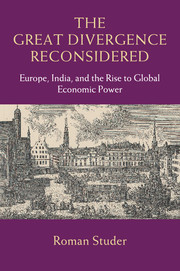Crossref Citations
This Book has been
cited by the following publications. This list is generated based on data provided by Crossref.
Bernhofen, Daniel M.
Eberhardt, Markus
Li, Jianan
and
Morgan, Stephen L.
2015.
Assessing Market (Dis)Integration in Early Modern China and Europe.
SSRN Electronic Journal,
Gupta, Bishnupriya
Ma, Debin
and
Roy, Tirthankar
2016.
Economic History of Warfare and State Formation.
p.
51.
Cox, Gary W.
2017.
Political Institutions, Economic Liberty, and the Great Divergence.
The Journal of Economic History,
Vol. 77,
Issue. 3,
p.
724.
White, Sam
Brooke, John
and
Pfister, Christian
2018.
The Palgrave Handbook of Climate History.
p.
331.
Federico, Giovanni
2018.
Handbook of Cliometrics.
p.
1.
Williams, Adrian C
and
Hill, Lisa J
2019.
Nicotinamide and Demographic and Disease transitions: Moderation is Best.
International Journal of Tryptophan Research,
Vol. 12,
Issue. ,
Sauter, Caspar
Grether, Jean‐Marie
and
Mathys, Nicole A.
2019.
A global compass for the great divergence: Emissions versus production centres of gravity 1820–2008.
The World Economy,
Vol. 42,
Issue. 10,
p.
2818.
Gelderblom, Oscar
and
Trivellato, Francesca
2019.
The business history of the preindustrial world: Towards a comparative historical analysis.
Business History,
Vol. 61,
Issue. 2,
p.
225.
Federico, Giovanni
2019.
Handbook of Cliometrics.
p.
633.
Roy, Tirthankar
2021.
Why geography matters to the economic history of India.
Australian Economic History Review,
Vol. 61,
Issue. 3,
p.
273.
Federico, Giovanni
Schulze, Max-Stephan
and
Volckart, Oliver
2021.
European Goods Market Integration in the Very Long Run: From the Black Death to the First World War.
The Journal of Economic History,
Vol. 81,
Issue. 1,
p.
276.
Swamy, Anand V.
2021.
The Cambridge Economic History of the Modern World.
p.
123.
Mocarelli, Luca
Ongaro, Giulio
and
Tedeschi, Paolo
2021.
The 19th century in the Lombard Alps: The unfulfilled promise of industrialization.
Journal of Agrarian Change,
Vol. 21,
Issue. 3,
p.
545.
Buggle, Johannes C
and
Durante, Ruben
2021.
Climate Risk, Cooperation and the Co-Evolution of Culture and Institutions.
The Economic Journal,
Vol. 131,
Issue. 637,
p.
1947.
Bernhofen, Daniel M.
Eberhardt, Markus
Li, Jianan
and
Morgan, Stephen Lloyd
2022.
Assessing Market Integration in the Early Modern Period.
SSRN Electronic Journal ,
Hao, Yu
Li, Yuanzhe
and
Nye, John V. C.
2022.
Wiring China: The impact of telegraph construction on grain market integration in late imperial China, 1870–1911.
The Economic History Review,
Vol. 75,
Issue. 3,
p.
857.
Ljungqvist, Fredrik Charpentier
Thejll, Peter
Christiansen, Bo
Seim, Andrea
Hartl, Claudia
and
Esper, Jan
2022.
The significance of climate variability on early modern European grain prices.
Cliometrica,
Vol. 16,
Issue. 1,
p.
29.
Jiang, George Hong
2023.
The Imperial Mode of China.
p.
227.
Brázdil, Rudolf
Dobrovolný, Petr
Pfister, Christian
Kleemann, Katrin
Chromá, Kateřina
Szabó, Péter
and
Olinski, Piotr
2023.
Weather and climate and their human impacts and responses during the Thirty Years' War in central Europe.
Climate of the Past,
Vol. 19,
Issue. 9,
p.
1863.
Federico, Giovanni
2024.
Handbook of Cliometrics.
p.
899.



